Related Research Articles

"The Bird" is a song from The Time's third album, Ice Cream Castle. The song was initially recorded in the studio in 1983 with all instruments by Prince, except guitar, which was performed by Jesse Johnson. This version was replaced by a live recording with the full band at the First Avenue on October 4, 1983. This is the first Time song to be released both live and featuring The Time as a band, rather than primarily Prince with Morris Day on vocals. The song has become a signature number for the band and continues to be played in every Time concert to this day. In addition, two additional live versions have since been released: one on Prince's Rave Un2 the Year 2000 DVD and one recorded at the House of Blues in 1998 for Morris Day's 2004 album It's About Time.

"Get Ready" is a Motown song written by Smokey Robinson, which resulted in two hit records for the label: a U.S. No. 29 version by The Temptations in 1966, and a U.S. No. 4 version by Rare Earth in 1970. It is significant for being the last song Robinson wrote and produced for the Temptations, due to a deal Berry Gordy made with Norman Whitfield, that if "Get Ready" did not meet with the expected degree of success, then Whitfield's song, "Ain't Too Proud to Beg", would get the next release, which resulted in Whitfield more or less replacing Robinson as the group's producer.

"Controversy" is a song by American musician Prince, the lead single and title track to his 1981 album. The song addresses speculation about Prince at the time such as his sexuality, gender, religion, and racial background, and how he could not understand the curiosity surrounding him.

"The Way You Do the Things You Do" is a 1964 hit single by the Temptations for the Gordy (Motown) label. Written by Miracles members Smokey Robinson and Bobby Rogers, the single was the Temptations' first charting single on the Billboard Hot 100, peaking in the Top 20 at number eleven; it also went to number one on the Cash Box R&B chart. The song has been an American Top 40 hit in four successive decades, from the 1960s to the 1990s. A version by Hall & Oates featuring Temptation members Eddie Kendricks and David Ruffin was nominated for a Grammy Award in 1986. A cover version by British reggae band UB40 hit number six in the U.S. in 1990.
"Rigor Mortis" is a song by American funk band Cameo, released on April 20, 1977 as a single from their debut studio album, Cardiac Arrest. In the US, the song peaked at number 33 on the Hot Soul Singles chart. In this instance "Rigor Mortis" is a euphemism for being lonesome on the dance floor.

"Nightshift" is a 1985 song by the Commodores and the title track from their album of the same name. The song was written by lead singer Walter Orange in collaboration with Dennis Lambert and Franne Golde as a tribute to soul/R&B singers Jackie Wilson and Marvin Gaye, both of whom died in 1984. The song was released as the album's first single in January 1985 by Motown Records. "Nightshift" was recorded in 1984 and became the Commodores' first hit after Lionel Richie's departure from the group. Bruce Springsteen covered the song in his 2022 studio album, Only the Strong Survive.

"Freeway of Love" is a song by American singer Aretha Franklin. It was written by Jeffrey Cohen and Narada Michael Walden and produced by the latter for Franklin's thirtieth studio album Who's Zoomin' Who? (1985). The song features a notable contribution from Clarence Clemons, the saxophonist from Bruce Springsteen’'s E Street Band. Sylvester, Martha Wash, and Jeanie Tracy provided backup vocals on "Freeway of Love".
Slow Dance is a song by R. Kelly with Public Announcement from the album Born into the 90's (1992). It was released as a single by Jive Records in August 1992.

"Try Me, I Know We Can Make It" is a song by American singer Donna Summer from her third studio album A Love Trilogy (1976).

"I Wonder If I Take You Home" is a song recorded by Lisa Lisa and Cult Jam with Full Force in 1984.

"The Breaks" is a song by American rapper Kurtis Blow from his self-titled debut album. It was released as a single in June 1980 and peaked at No. 87 on the Billboard Hot 100. It was the first certified gold rap song, and the second certified gold 12-inch single. In 2008, the song ranked #10 on VH1's 100 Greatest Hip-Hop Songs.

"I'm Still in Love with You" is a song originally recorded by Al Green. Released from the album of the same title, the single spent two weeks at #1 on the Hot Soul Singles chart in August 1972. It also peaked at #3 on the Billboard Hot 100 singles chart that same year. It would eventually sell over one million copies and is considered one of his most popular songs. Billboard ranked it as the No. 59 song for 1972.

"You Bring Me Joy" is a song by American singer-songwriter Mary J. Blige. It was written by Blige, Sean "Puffy" Combs, Joel "Jo-Jo" Hailey, and Chucky Thompson for her second studio album, My Life (1994), while overall music production was helmed by Combs and Thompson with the vocal tracks being produced by Jo-Jo. The song is built around a sample of "It's Ecstasy When You Lay Down Next to Me" (1977) by singer Barry White. Due to the inclusion of the sample, Ekundayo Paris and Nelson Pigford are also credited as songwriters. "You Bring Me Joy" served as the third single from My Life and peaked at number 29 on the US Hot R&B/Hip-Hop Songs, also topping the Hot Dance Club Songs.

"Come Go with Me" is a song by American girl group Exposé from their debut studio album Exposure (1987). Composed and produced by Lewis A. Martineé, the song was released in January 1987 as the third single from Exposure. The group’s second lineup recorded "Come Go with Me", with Jeanette Jurado singing lead vocals, and Gioia Bruno and Ann Curless singing backup. Some vocals from the original lineup of Exposé remain in the released track.
"Jump to It" is a 1982 song by American recording artist Aretha Franklin. The track is from her Gold-certified 1982 album of the same name, produced by Luther Vandross. The song was written by Vandross and Marcus Miller and features background vocals performed by Vandross and Cissy Houston. The single reached No. 1 on Billboard's Hot Soul Singles chart, remaining there for four consecutive weeks.
"Operator" is a 1984 R&B/electronic dance song by Midnight Star, produced by then-current bandmember Reggie Calloway, released as a single from their album, Planetary Invasion.

"(You're Puttin') A Rush on Me" is a 1987 single by American singer Stephanie Mills. The single was her third number one on the Hot Black Singles chart and second number one in 1987. The single spent one week at the top spot and crossed over to the Billboard Hot 100, peaking at number eighty-five. "(You're Puttin') A Rush on Me" also peaked at number twenty-three on the dance charts.

"Perfect Way" is a song written by Green Gartside and David Gamson and performed by the British pop band Scritti Politti. It was featured on the band's second and most successful studio album, Cupid & Psyche 85, released in June 1985. The song features synthesizer in its instrumentation.

"Breakdance" is a song written by Giorgio Moroder, Bunny Hull, and the song's performer, Irene Cara. Moroder's obsession with the dance hit "Rockit" by Herbie Hancock fueled his composition of the music, and Cara was inspired by the street performers she saw growing up in the South Bronx to write lyrics about what was then called breakdancing. Released in March 1984, it was the third single that originated on her What a Feelin' LP and her first to make the top ten in the US since the album's title track went to number one almost a year earlier. "Breakdance" also charted in several other countries and had a dance remix that was also well received.

"Runaway Love" is a 1978 disco single written and produced by Gil Askey, and performed by Linda Clifford.
References
- ↑ Whitburn, Joel (2004). Hot Dance/Disco: 1974-2003. Record Research. p. 96.
- ↑ Whitburn, Joel (2004). Top R&B/Hip-Hop Singles: 1942-2004. Record Research. p. 116.
- ↑ John Leland (July 1985). "Singles". Spin . No. 3. p. 34.
- ↑ "Cheyne Chart History | Billboard". www.billboard.com. Archived from the original on 1 February 2019. Retrieved 17 January 2022.